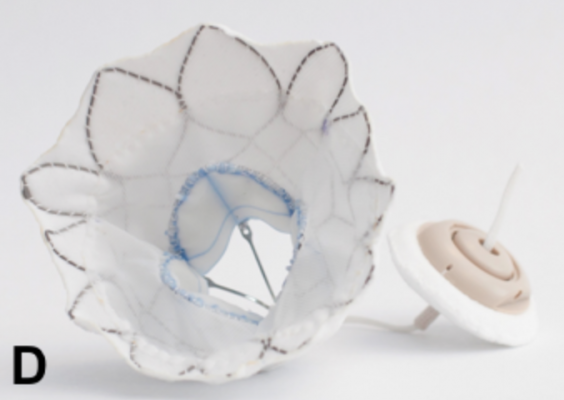
May 25, 2018 — Abbott announced favorable outcomes from the first 100 patients treated in a global study of its Tendyne Transcatheter Mitral Valve Replacement (TMVR) system. According to Abbott, Tendyne is the first and only mitral replacement valve that is repositionable and fully retrievable to allow for more precise implantation, helping improve patient outcomes. The trial is the largest study of a transcatheter mitral valve replacement device to date. Results at 30 days demonstrated that Tendyne is associated with a significant reduction of mitral regurgitation symptoms and low mortality rates.
The data were presented during a late-breaking session at EuroPCR, the annual meeting of the European Association of Percutaneous Cardiovascular Interventions (EAPCI), May 22-25 in Paris, France.
Mitral regurgitation (MR) is a debilitating, progressive and life-threatening disease in which the heart's mitral valve does not close completely, causing blood to flow backward and leak into the left atrium of the heart. The condition can raise the risk of irregular heartbeats, stroke and heart failure. Nearly one in 10 people over the age of 75 have moderate to severe MR1, which is often difficult to diagnose.
Tendyne offers patients with severe MR a life-saving treatment option, replacing their native mitral valve without open heart surgery to reduce their heart failure symptoms. As the first and only repositionable, fully retrievable and minimally invasive replacement option, Tendyne's unique features help physicians correctly implant the device for improved patient outcomes.
"Treating people with severe mitral regurgitation can be challenging because of advanced age, frailty or other complicating factors, and alternative treatments to surgery are needed," said principal investigator David Muller, MBBS, M.D., St Vincent's Hospital, Sydney, Australia. "These new data on the Tendyne replacement valve offer early hope for patients who are not eligible for transcatheter valve repair or surgery to relieve symptoms."
The global study plans to enroll up to 350 adult patients with symptomatic MR who are not eligible for open-heart surgery to repair or replace the mitral valve. The primary endpoints of the study are safety – defined as device success and freedom from device- and procedure-related serious adverse events – and performance assessed by reduction in mitral regurgitation severity. Left untreated, MR may result in a variety of symptoms, heart failure and ultimately death.
In these early results from the study, investigators successfully implanted the Tendyne system in 97 of the first 100 patients. Treated patients experienced a significant reduction in mitral regurgitation at 30 days, as well as improvements in symptoms based on New York Heart Association (NYHA) grade severity and the Kansas City Cardiomyopathy Questionnaire (KCCQ), important assessment methods of patients' health status. The KCCQ score is the standard tool used to assess quality of life in patients with MR, and improvements were observed in treated patients.
At baseline, 99 percent of patients enrolled had a MR grade of ≥ 3+, which at 30 days was reduced to none or trace in 98.7 percent of patients. Data showed a 97 percent implant success rate with no associated deaths or strokes. The 30-day results demonstrated low rates of serious adverse events and low mortality (6 percent (6/100) versus 7.9 percent STS-predicted mortality for surgical valve replacement, or the Society of Thoracic Surgeons score used to predict long-term survival. This represented a favorable 0.76 (6/7.9) ratio of observed-to-expected mortality, or a measure of assumed patient deaths due to age or other comorbities beyond a care team's control.
Tendyne is currently under clinical investigation in Europe, and Abbott expects to enroll the first patient in the U.S. pivotal trial in the coming months.
The catheter-based, minimally invasive device is delivered to the heart through a blood vessel in the leg. By securing a portion of the leaflets of the mitral valve with a clip, the heart can pump blood more efficiently throughout the body, thereby relieving the symptoms of severe MR and improving patient quality of life.2 For MR patients who are not candidates for traditional open-heart surgery or a minimally invasive mitral valve repair, Tendyne may offer a new valve replacement treatment option.
Links to other 2018 EuroPCR late-breaking trials
For more information: www.pcronline.com
References
2. http://www.abbottvascular.com/docs/ifu/structural_heart/eIFU_MitraClip.pdf
#EuroPCR


 January 05, 2026
January 05, 2026 









